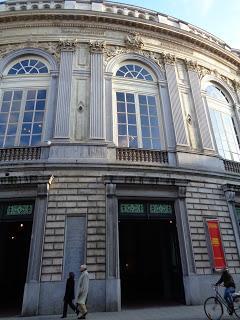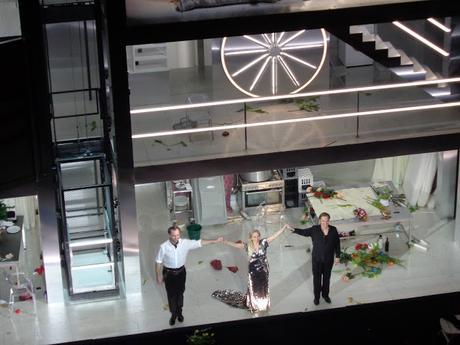
Ghent's opera house
I may not be able to travel (much) for opera, but when traveling, I do seek opera out. So, on April 16, I took myself to hear Zemlinsky's Der König Kandaules, performed by Opera Vlaanderen in Ghent. It was a serendipitous chance to hear a relative rarity. I went in expecting to find the score difficult; I found it seductive. Given my fondness for crazy German orchestration (technical term), I probably shouldn't have found this surprising... but the richness of the score was absorbing and intricate. The Opera Vlaanderen performance benefited from really fine singing, as well as beautiful orchestral work. The varying textures of the score--lush and spiky by turns--were impressively realized by the orchestra under Dmitri Jurowski. Special kudos were deserved by the woodwinds, not only the important flute players, whose seductive playing is referenced by the characters on stage, but also the insinuating oboe. The brass, too, were admirably secure. The wildness--and, yes, strangeness--of the music felt at all times irresistible.Initially, I was unsure of how I felt about Andrij Zholdak's production. Visually striking and deliberately strange, it emphasized the surrealism of the drama (based on a play by André Gide) and housed it in the cool contemporary lines of a floodlit mansion. I appreciated the effort to make the anxiety of the early twentieth century feel immediate, and appropriately Fremd, to the early twenty-first century. (Parenthetically, I also appreciated the reference to The English Patient's use of Herodotus in one of the production essays.) Spoken texts of the incomplete score were omitted, which I found helpful. This is, after all, mythology, and it loses something from being over-explained. At times, the story seemed to play with time itself, with Gyges' murdered wife rising again, defiant, undamaged. The claustrophobic kitchen (where Gyges guts the fish) and the servants' quarters were sharply separated from the spacious display rooms of the palace; but the palace itself is also divided, its own kitchen being separated from the other living spaces, from the bedroom. Everything is cut off from the garden, which is its own, unlimited world. I wished I had more of an idea of what was going on with the two monstrously large fish. But I liked the mysterious children who seemed to represent the desires of Kandaules and Nyssa. And I loved - loved! - that Nyssa was angry, and, sometimes, when she had no sung lines, screamed to express this anger. More opera productions that comment on the silence and silencing of women are surely a desideratum. The success of this one was in no small part due, I thought, to the committed, charismatic singing - and acting - of the cast.
There was not a weak link to be heard in the secondary cast. As Syphax, Michael J. Scott was incisively odious. Til Faveyts, too, stood out, taking the roles of Philebos and the cook with a rich bass, lending his pronouncements a sometimes-enigmatic weight. The three principals each gave remarkable performances, and had remarkable chemistry with each other. Gidon Saks was riveting as Gyges, the fisher, a tortured everyman. His bass-baritone impressed with its sheer force; his interpretation with its nuance. I was struck by his good phrasing, and by his use of vocal color. Trapped by the power structure of the court, and tormented by Kandaules, Gyges could be portrayed with boring pathos, but Saks gave the fisher's rage and anguish emotional and musical detail.
As Nyssia, Kandaules' queen, Elisabet Strid gave the kind of performance that had me composing a mental wish-list of other roles I'd like to hear her in. The more dangerous Strauss heroines and Sieglinde are both on it. Strid moved like a trapped panther, and was still in a way that reminded me of Gillian Anderson's Stella Gibson. (Is The Fall an opera yet?) Her voice, too, impressed me with its expressive range, as well as its power. I found Strid's gutsy lower register every bit as compelling as the shimmering, powerful high notes which she could spin out or nail to the back wall as required. She also contributed beautiful legato singing. I know I'm gushing; I do so unrepentantly. Dmitry Golovnin, in the title role, sang unforgiving vocal writing with remarkable beauty. Golovnin's lack of apparent strain is (in my listening experience) such a rarity in similar roles, e.g. Bacchus and Herodes, that I was surprised when reflecting on it afterwards. At the time, I just enjoyed. He resisted not only the temptation to caricature Kandaules' tyranny, but also the temptation to make Kandaules sympathetic enough that the audience would overlook his tyranny. Golovnin's expressive singing was used to characterize a nervous, unpleasant, insecure man, who could not imagine possibilities beyond his own power. At the center of an often surreal drama, he was all too believable.

The principals take their bows: L-R Saks, Strid, Golovnin

